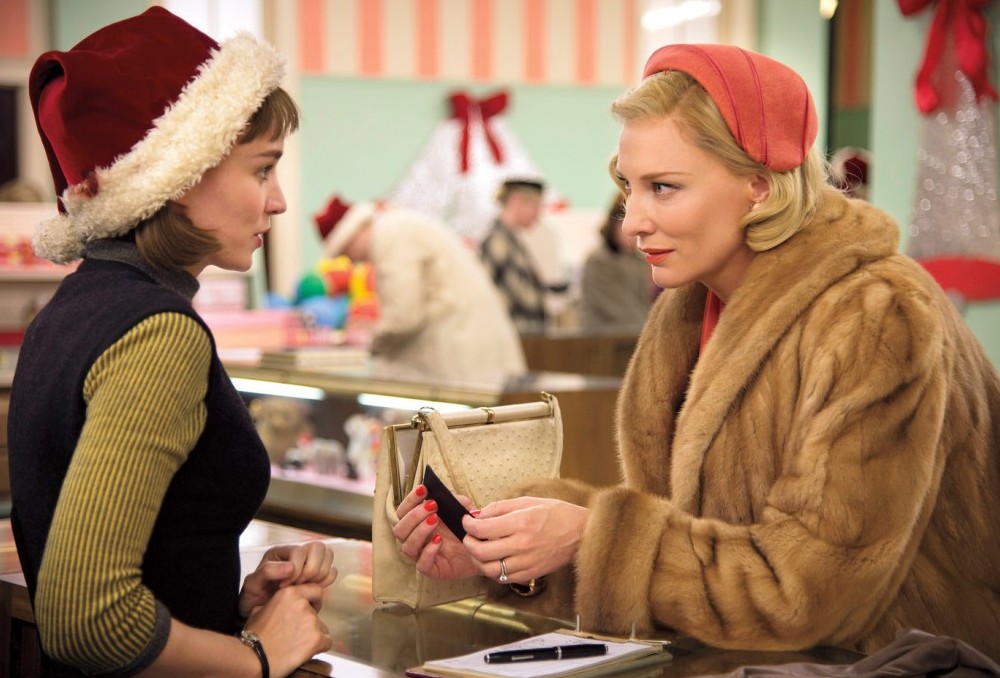Based on Patricia Highsmith’s 1952 novel ‘The Price of Salt’ and adapted by screenwriter Phyllis Nagy in her feature debut, Todd Haynes (‘I’m Not There’ 07, ‘Far from Heaven’ 02) directs this tale of forbidden desire and romance set in the Big Apple in 1950 with an obvious loving devotion to the era and the setting, but it’s here that too much of the focus clearly lies, leaving his characters largely stifled and suffocating in all the hazy nostalgia. Rooney Mara plays Therese Belivet, a young and uncertain shop assistant, too accustomed to saying yes to people, who one day lays eyes on the well-to-do and elegant Carol Aird (Cate Blanchett), who enters her store in search of a gift for her young daughter and encounters an instant lustful attraction between the two of them.
The initial sexual atmosphere prompts the pair to arrange a meeting but it actually largely disappears from there on in, appearing in intimate moments in the future but never really creating the tension that was set-up at the onset. Indeed, their first moment of real physical contact comes when Therese places a comforting hand on Carol’s shoulder and their fingers deliberately touch – but then the camera cuts out and we are taken to a scene later in the evening when they’re outside talking about family matters. That’s terrible, we really needed to see that scene play out, to see the reactions and the body language, to feel either tense and uncomfortable or excited, or to at least see each of the characters’ reaction to the touch, as it is we view the moment from behind as well so we know nothing and then it’s all gone, much like the romance and the libidinous exposition from the film.
There’s an element of the material having lost some relevance, what was perhaps written to deliberately provoke and challenge readers in 1952 is simply no longer considered remotely risqué, and much of the background: Carol’s husband is vying for custody of their daughter now that he realises his wife prefers carpet munching to spending time with him and Therese’s boyfriend wants to get married but she thinks she might want to be a photographer and be gay instead, all carries the artificial feel of the movie with it, a set of traps placed to confine the women and potentially doom their affair, conveniently providing a framework for theoretical tension and reasons for them to want to be together – as much to share in an escape from their constrictive lives as friends as to begin a new physical and emotional entanglement.
Carol’s daughter looks remarkably like a younger version of Therese, and this is both no accident and one of the more interesting elements of the film, the rest could have done with more insights into the human condition but alas the trysts never really bite, not even in bed, and moments of charm are leavened out by the dominance of effusive boredom and meaningless aesthetics, driven home by dressing Mara up like Audrey Hepburn at the end of the film, even though it’s too early for her to be copying her anyway unless she really took to Hepburn’s cigarette selling cameos. Similarly, if we look at the pic above, which is where the pair first meet, we can see all the thought gone into positioning and staging, much like a Vetriano painting with suggestive angles all over – note how the pen points phallically toward Therese following precisely the eager bent of Carol’s gaze and posture, see the way she pinches the card she’s holding and look at how Therese’s right breast is perfectly framed to be protruding proudly toward that which is making her heart race. All this is fine, but there’s too little soul beneath the surface artistry.
The leads both offer promise, especially Mara, but they never fully convince romantically and one hopes the affair doesn’t become another female Oscar winner purely because of its content and its brief moments of nudity – which one does question the film’s need for, and yet they provide some of the more memorable moments and I think there’s always going to be a certain, ahem, je ne sais quoi about watching two of Hollywood’s most attractive leading ladies going at it under the sheets. Visual peaks aside, I found myself wondering, would changing the sex of one lover alter the film in any way? No, is the answer, it would be just as tedious.

